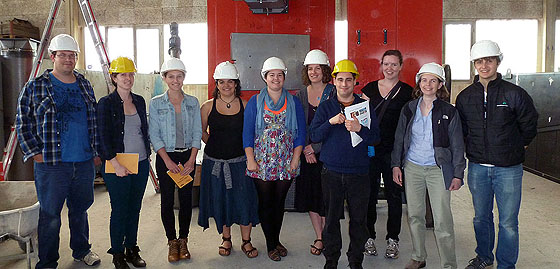UNBC Pilot Program Bringing Austrian Bioenergy Know-how to Northern BC
A pilot program launched recently by the University of Northern British Columbia is providing UNBC engineering students with valuable experience needed for implementing bioenergy technology in Northern BC communities. The course, Northern BC Bioenergy, offers UNBC Environmental Engineering students the opportunity to learn about bioenergy and district heating systems design in Austria, where these systems are common, and gives them access to both university and industrial manufacturing expertise.

Media Download: UNBC students, faculty, and staff at the the Binder boiler manufacture facility in Bärnbach, Austria. Left to right: Rico Berkhout, Amanda Drew (UNBC Energy Technician), Shayna Scott, Soledad Ronco, Rebecca Page, Allison Matfin, Thomas Cheney, Kathleen Horita, Dr. Belinda Larisch (Instructor), and Sean Carlson.
The course is based around a two week field trip to Austria, which the students took this spring with the goal of broadening Northern BC knowledge of bioenergy systems. The students will be designing bioenergy systems for local communities to determine the feasibility of implementing bioenergy heating systems in their communities.
“Having people trained and experienced with this technology will benefit Northern BC as more rural and remote, off-grid communities express interest in implementing these systems,” says instructor and UNBC Adjunct Professor Belinda Larisch, who developed the course. “Some communities, such as Gitsegukla near Hazelton have already started. Bioenergy represents one possible sustainable energy solution, as it utilizes local renewable resources. Using locally sourced bioenergy also makes sense economically; it will create jobs in these communities and reduce reliance on external energy sources.”
Fifteen participants, including seven UNBC Environmental Engineering students and one UNBC MA NRES student, participated in the course, which was delivered with the assistance of the Canadian Trade Commission and the bioenergy industry in Austria, and supported in part by donations from the BC Bioenergy Network, and the International Bioenergy Conference and Exhibition, which is held in Prince George every two years.
A critical component of the course is the relevance of the student projects, all of which are based on actual sites and designed using real energy data. The students have been assigned to one or two communities, which were either already involved with bioenergy projects, or intend to implement the technology in the future. These communities include Barkerville, Wells, Hazelton, New Hazelton, UNBC, and Westbank First Nation. A further project was closer to home, involving UNBC’s student residences and day care.
This course was also supported by the Northern Health Authority, who provided students with projects for hospitals and clinics in McBride, MacKenzie, Smithers, Masset , Quesnel, Terrace, Dease Lake, and Burns Lake. The students will be submitting rough drafts of their designs for how bioenergy technology can be added to the existing heating systems in these communities by June 30, with their final designs due in September. The results will be shared with the project sponsors.
“Northern BC needs people who know how to design bioenergy systems and networks and there are no better people to learn from than the Austrians who have been developing this technology for more than three decades,” says UNBC Environmental Engineering student Sean Carlson of Prince Rupert, who says he intends to return home after graduation to pursue a career as an Engineering Consultant and apply what he learned in the course. “I’ve learned the technology is not feasible for every community, but with Northern BC’s abundant forests, and with so many off-grid communities, I think it’s going to be very big in the near future.”